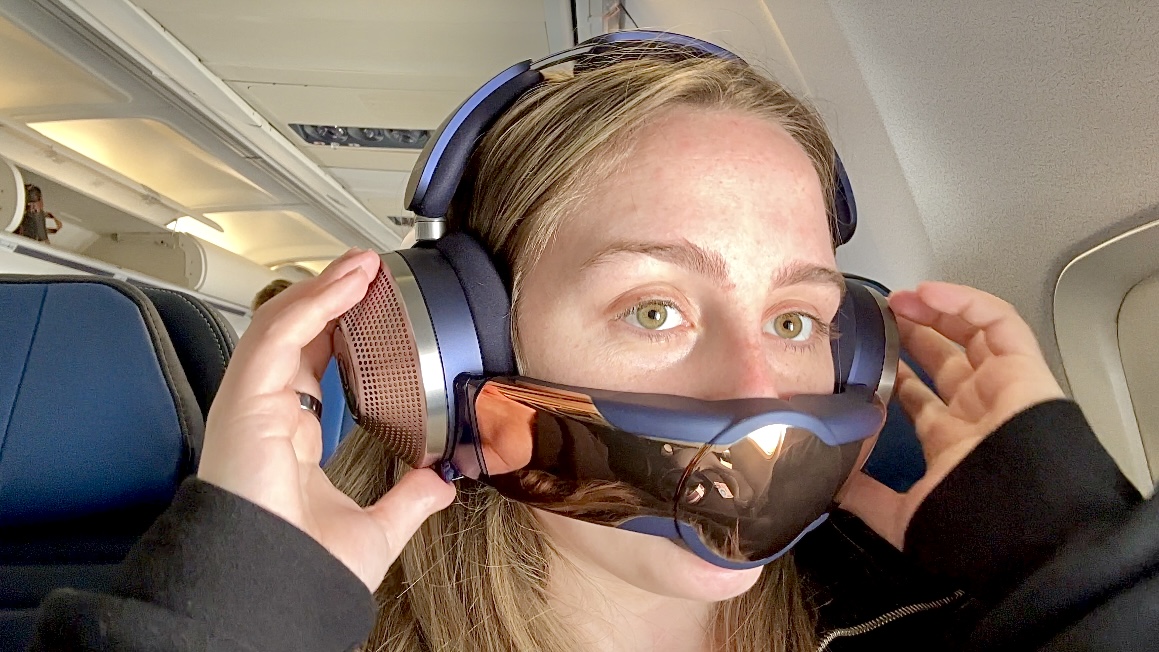I wore the Dyson Zone headphones on a long flight — it was pretty much a disaster

One of the first things I did with Dyson Zone noise-cancelling and air-purifying headphones was pack them for a 6-hour flight from New York to California. And while I was initially excited to travel with the futuristic device, the experience wasn’t as user-friendly as I hoped.
The $949 Dyson Zone are headphones with air purification technology in the ear cups. The cups push filtered air through a magnetic visor that many have compared to the mask worn by DC super villain Bane. But concerns about looking nefarious aside, I thought that current fed to my nose and mouth through the Dyson Zone would be a major improvement to stale airplane air.
I knew that the headset wouldn’t protect me from any airborne viruses lurking among my fellow passengers. In fact, airplane air is filtered through sophisticated HEPA systems, while the Dyson Zone is only rated to filter certain pollutants, such as nitrogen dioxide. In other words, there was little the Zone would offer in terms of improving the air I breathed. Instead, I hoped a constant, cool airflow could ease some of my flying anxiety. Bonus points if it fended off unsavory odors.
It’s a bulky product
When it came to packing the Dyson Zone, I had to leave behind the included purse-like carrying case. I opted for the soft drawstring bag in order to fit the headphones and visor into my backpack along with all my other tech and flight snacks.
@kate_kozuch
♬ Wii – Mii Channel – Super Guitar Bros
But in the confines of the coach section, getting the Dyson Zone system out of my bag proved a struggle. Not only is the device a hefty 1.47 pounds with the visor, but the visor doesn’t stay attached if the headset gets bumped around. Juggling my iPad, water bottle and neck pillow, the Dyson Zone certainly didn’t grant me grace.
People didn’t stare
Once I had the Dyson Zone set up for use, I sat watching passengers fill into their seats, waiting for someone to notice the contraption on my face. No one did, or at least, I didn’t catch anyone giving a curious glimpse.
I’ll admit, I didn’t really care about whether people stared. But it surprised me that people didn’t seem interested in what I was wearing. Don’t they know the Dyson Zone could be a glimpse at the type of thing everyone uses in the future? At least I could settle in for the long flight knowing everyone around me would be minding their own business.
Battery life became a problem
About two hours into my flight, a status chime in the headphones indicated a low battery life (you can also check the battery status of the headphones on your iPhone, too). My options were to a) detach the visor and enjoy a bit more time with audio only or b) spend the rest of the flight tethered to a charging cable.
My options were to a) detach the visor and enjoy a bit more time with audio only or b) spend the rest of the flight tethered to a charging cable.
As I had been enjoying the filtered air, I opted for the latter. Luckily, I could reach the outlet between the seats. But the receptacle must’ve been a bit loose, because not long later, I heard the low battery life chime in my ears again. I eventually wiggled the charger at an angle that offered consistent charging through the flight. Still, not all airplanes provide outlet access, so I could’ve had a problem. I didn’t have room to pack my Sony WH-1000XM5s as a back up, after all.
Would I wear the Dyson Zone on a flight again?
Between the bulk and battery life struggle, the Dyson Zone probably won’t be coming with me on any more flights. As much as I enjoyed the cool airflow and the sound quality sufficed for binging reality TV, they’re impractical for air travel.
Unless I had more room at my seat (or perhaps a hook to hang the headset on) and guaranteed outlet access, the Dyson Zone isn’t worth the hassle. Plus, an airplane isn’t the ideal environment to benefit from the headset’s filtering features. Instead, I’ll stick to my non-air-purifying headphones for my next trip, and give Dyson Zone a go outside in the busy city.
More from Tom’s Guide
For all the latest Technology News Click Here
For the latest news and updates, follow us on Google News.
